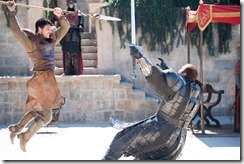
Neo-Calvinist Godfather John Piper made waves again a couple of weeks ago when he posted a 12-minute episode on his Ask Pastor John podcast concerning Game of Thrones. A listener asked if – given the show’s infamous nudity – a Christian person should watch. Piper’s response was a resounding No. (You can find a transcript of the episode here.)
“The closer I get to death and meeting Jesus personally face to face, and giving an account for my life and for the careless words that I have spoken (Matthew 12:36), the more sure I am of my resolve never intentionally to look at a television show or a movie or a website or a magazine where I know I will see photos or films of nudity. Never. That is my resolve. And the closer I get to death, the better I feel about that, and the more committed I become.”
Piper goes on to challenge all Christians to join him in not watching as a holy witness. He packages this challenge as a series of questions:
“Here are 12 questions to think about, or 12 reasons why I am committed to a radical abstention from anything I know is going to present me with nudity.”
It probably goes without saying that these are not honest questions, of the kind Matt Lee Anderson invites us to ask. But they do give us a window into Piper’s understanding of holiness and our Christian interaction with the world.
What’s not up for debate is whether Game of Thrones uses nudity artistically. No one thinks the nudity in the show is artistic.

No one. Not Christians. Not Saturday Night Live. Not College Humor. (Those last two links are NSFW). Christians and non-Christians agree the show makes terrible choices when it comes to presenting the female form. So no one in this conversation (that I’m aware of) is defending the show’s use of nudity.
(There’re some other discussions that would be helpful were this the case – like “What counts as good use of nudity?” and “Does seeing a nude person automatically lead to lusting?” But given the tenor of the larger cultural discussion of Game of Thrones’ use of nudity, those aren’t part of this particular conversation.)
So the question is not, “Is the nudity good or bad?” The question is, “Given the bad use of nudity, should Christians avoid the show?”
Piper says Yes. He assumes the mere presence of nudity in a show negates any other positive potential a show like Game of Thrones has. In Piper’s analysis, the unholiness of nudity contaminates the whole of the project.
Is this a workable model of holy engagement in the world?
No – it’s a model of holy disengagement. If we apply Piper’s logic consistently (which he himself doesn’t), there’s little we could realistically participate in. Piper claims that nudity is fundamentally different from violence because,
“Nudity is not like murder and violence on the screen. Violence on a screen is make-believe; nobody really gets killed. But nudity is not make-believe.”

Since when has whether something’s “make-believe” determined whether it’s holy? If Piper were consistent in his Don’t-Do-It-If-It’s-Not-Holy ethic, surely violence would be included as well. But wouldn’t foul language – also condemned in Scripture? What about broken families or disobedient children – a staple of American sitcoms.
But why stop there? Does holiness buy products produced under unethical conditions? Or eat food that’s not ethically produced? I could belabor the point, but surely it’s obvious: the ethic Piper’s 12 questions implies isn’t something Christians realistically apply. Were we to, we would certainly be an unusual community. But outside of monastic communities, Christians don’t actually do this.
But should we? Isn’t Piper’s point – that we should live lives of holy disengagement – the way Jesus calls us to?

No, actually. The sort of holy detachment Piper describes looks much more like the Pharisees of Jesus’ day than Jesus himself. The Pharisees were those who kept themselves detached from the larger “sinful” culture, who created a holy subculture in which their religion could be protected and safe.
Jesus, on the other hand, engaged the broken culture around him and brought healing. He was a change agent, a catalyst for good in the midst of bad. Jesus didn’t see holiness as something to be protected, but as something dangerous. Jesus embraced the broken world around him fearlessly, confident that the world couldn’t contaminate him, that in fact he would contaminate them with the boundless, omnipotent love of God.
So what does that mean for Game of Thrones?
I’m happy to follow Paul’s advice in Romans 14 and 1 Corinthians 8, and allow it to be a matter of conscience. To those who say they can’t watch Game of Thrones because of the nudity, I will offer the books. I will certainly not insist they must watch. But those whose conscience is clear, who enjoy the myriad other profound and poignant meditations on God, human nature and morality the show offers, I say watch on.
Paul specifically chides us not to judge those believers who have different convictions than we do. If a weaker believer doesn’t feel comfortable watching nudity, good. If a stronger believer can watch a show like Game of Thrones and separate the good from the bad, good. To each their own, to paraphrase Paul. Let the Spirit guide us all.

